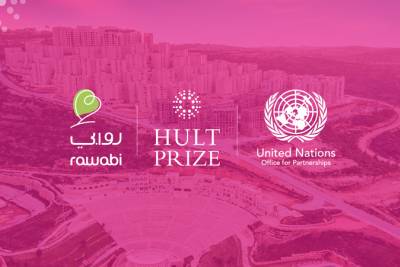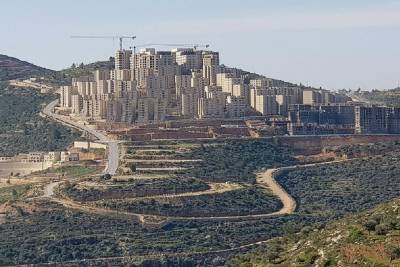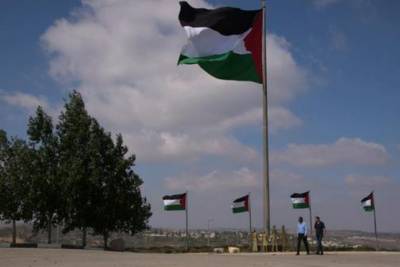THE FUTURE OF RAWABI: PALESTINE’S CONTROVERSIAL PLANNED CITY
Fox and Hedgehog - ELLIOT SETZER - In the hills of the West Bank, a sleek, modern city is slowly taking shape, complete with homes for 40,000, shopping malls, a conference centre, and a view of the Tel Aviv skyline. Unlike other cities, this one is not a settlement. Since 2010, Palestinian investor Bashar Masri has been building an entirely new city in the West Bank. An audacious project—the biggest investment in Palestinian history—Rawabi, meaning ‘hills’ in Arabic, has become part of the larger Israeli-Palestinian conflict and has sparked significant controversy. Over budget and behind schedule, this city will help determine the future of Palestine—whether it succeeds or fails.
Bashar Masri, the vision behind Rawabi and its chief financier, is tall, slim, and greying at the temples. In photos and videos, he typically wears elegant black suits, occasionally with the addition of a hard hat. Originally from Nablus, in the northern end of the West Bank, Masri emigrated to the U.S. in 1977 and studied chemical engineering at Virginia Tech. After spending a few years working as a consultant in Washington, he returned to Palestine in 1995 and formed the Massar group of companies, which today controls 30 businesses. After successfully building planned cities in Morocco, Masri began planning Rawabi in 2007. It would be Palestine’s first planned city.
Bashar Masri is a businessman. He launched the project to make money. However, the city of Rawabi is also a political symbol for many Palestinians and Israelis, including Mr. Masri. Rawabi is designed to offer a message of resistance to Israel, to demonstrate the stewardship of the Palestinians and the success they can achieve, and to reinvigorate a stagnant economy. It also plays a central role in stopping the encroachment of Israeli settlements, the nearest of which is only one small valley away. In interviews, Mr. Masri can drop a couple of inspiring sound bytes per minute. “We want to show them that we’re not about destroying Israel. We’re about building Palestine,” he tells one reporter. “We’re about having a better life for ourselves and our people.” He tells another interviewer, from PBS: “It’s a symbol of the Palestinian state. And the Palestinian state is a big step towards peace.” Rawabi has become embedded in a larger conflict not only because it is the biggest investment in Palestinian history, valued at $1.2 billion U.S., but also because it is a symbol that has sparked controversy. Throughout its construction, it has dealt with serious obstacles that spring both from the precarious nature of business in the West Bank and from its political significance.
One obstacle was that by 2014, four years after construction had begun, no water had yet been secured for the city. Rawabi had become a small player in the larger water politics of the West Bank. Under Article 40 of the 1995 Oslo II Agreement, all new water facilities in the West Bank require approval from a Joint Water Committee, which effectively grants Israel a veto over Palestinian water developments. For its part, Israel has leveraged this power by making its approval of Palestinian water projects conditional on Palestinian approval of water projects for settlements. For fifteen years, the PA’s policy was to accept the arrangement and consent to all proposed water facilities for settlements. However, in 2010, the PLO Executive Committee decided they would no longer approve settlement water infrastructures, resulting in five years of deadlock with neither side approving any water projects. Until February 2015, this included the proposal submitted for Rawabi.
However, Mr. Masri managed to secure sympathy from world leaders and members of the international community, including former British prime minister Tony Blair. Though the National Infrastructure, Energy, and Water Minister Silvan Shalom refused to approve a pipeline until the PA returned to the committee, the Prime Minister’s Office eventually overrode the decision. Perhaps intended as a gesture to the U.S., Netanyahu made the decision on February 27th—the eve of his trip to Washington to address a joint session of Congress.
Water finally started flowing through Rawabi’s pipes last May, but the project is still struggling. The project is two years behind schedule, at least $300 million over budget and only 700 apartments have been sold. No tech company, beyond one owned by Mr. Masri, has agreed to open an office in the city. Furthermore, the pipeline constructed last May only provides enough water for 5,000 residents—roughly an eighth of the city’s intended size. In short, Rawabi is in danger of becoming a ghost town.
If Rawabi faces numerous obstacles, the Palestinian Authority (PA) seems unwilling to help. According to Amir Dajani, a top Rawabi developer, “not one shekel from the PA has come to us.” As well, developers claim that the Palestinian Authority has not followed through on promises to provide public goods such as hospitals and schools for Rawabi. Currently, the city’s three schools and medical clinic are all privately funded, as is the sewage and water system, at a cost of $150 million.
Perhaps the PA’s reluctance to support Rawabi springs from Masri’s reconciliatory approach to relations with Israel. Masri does not seem to view the Israeli-Palestinian relationship as zero-sum, which antagonizes those who view Israeli and Palestinian interests as conflicting. “They’re building, and I think the international community, and particularly those who love Israel—the Rabbis and the Jews from all over the world—want to see, or prefer to see, a prosperous Palestinian state. Because a prosperous Palestinian state is also good for them and for their beloved Israel.” A story from The Telegraph quoted an anonymous PA official as saying that “The Israelis love Rawabi, and the fact that they do is a matter of concern for us. [But] no one in any position of responsibility is going to say anything against it.”
Rawabi has drawn more overt criticism from others. Masri has been criticized by numerous groups for constructing using Israeli materials. The Electronic Intifada, a popular news website, has criticized Masri for using Israeli supplies, and the Palestinian BDS National Committee has criticized Masri for encouraging Israeli companies to set up businesses in Rawabi. The BDS committee accused him of “advancing personal interests and profit making at the expense of Palestinian rights.” For instance, 85 percent of Rawabi’s cement comes from Nesher Israeli Cement Enterprises, and the rest comes from Jordan. While this sourcing is largely due to necessity, it sits awkwardly with Masri’s rhetoric which promotes Rawabi as an act of defiance against Israeli occupation.
Other have accused the city of Rawabi of normalizing the current relationship between Israel and Palestine. By building a modern, comfortable Palestinian city complete with movie theatres, parks, and beautiful condos, some charge that Masri is sugarcoating the occupation and undermining claims of Palestinian discontent. “The project creates this illusion that there is this happy space in Palestine that is independent of the military occupation which governs many aspects of Palestinian life,” says Yousef Munayyer, the former executive director of the Palestine Center. Mustafa Barghouti, a member of the Palestinian Legislative Council, opposes Rawabi for this reason. “My worry is that there is a certain trend in certain media, encouraged, of course, mainly by Israel or those who are connected to Israel, mainly to show that “things are fine, things are okay, Palestinians are normalizing and accepting the system of occupation—and they even have a new city.” That is not true. This is not the real story.”
As residents have begun to move in over the past year-and-a-half, Rawabi’s difficulties and the controversy surrounding the city show no sign of abating. Whether the city becomes a bustling metropolis and economic hub or a ghost town without water remains to be seen. And it is not clear which way things will go.
To view original article, Click Here.



